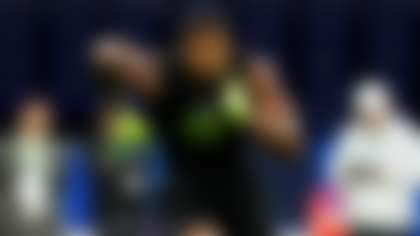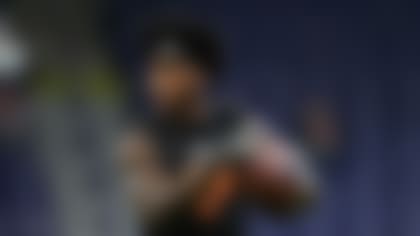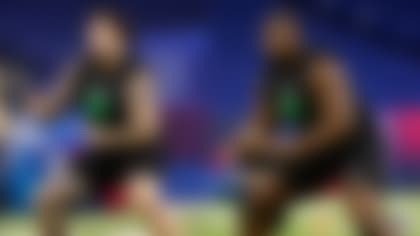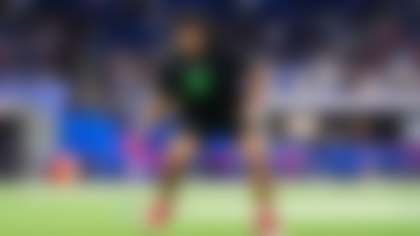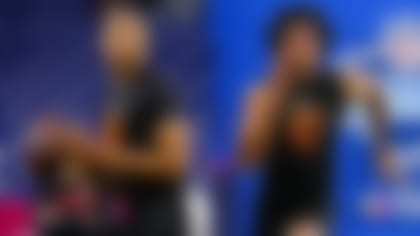Derek Carr's robust contract ($25 million per year) has once again turned the spotlight on the NFL's most important position. But for almost two thirds of the league, the quarterback is not the best player on his own team. Here's a look at 19 teams in the NFL that boast another player on the roster better than the QB.
Arizona Cardinals: David Johnson, RB
The Marshall Faulk comparisons became a little more apt after Johnson compiled an MVP-worthy 2016 campaign. Had Arizona made the playoffs last season, we would have been talking about Johnson the same way Arizona offensive consultant Tom Moore has -- as colleague Chris Wesseling pointed out, Moore likened Johnson to a young Franco Harris. In an age of specialty backs, a true center-of-the-offense bell cow elevates the entire system, quarterback included.
Buffalo Bills: LeSean McCoy, RB
Tyrod Taylor was certainly in the discussion, though I would place him just a fraction below LeSean McCoy, Kyle Williams, Marcell Dareus and perhaps even Richie Incognito (thanks to the lineman's late-career resurgence). McCoy had his second-best scoring season (13 rushing touchdowns) in 2016 and managed a career-high 5.4 yards per carry. Entering his age-29 season, McCoy is still stunningly elusive.
Chicago Bears: Jordan Howard, RB
I was tempted to list Pernell McPhee here, given how fun he was to watch in John Fox's defense. However, Chicago is building a very good offensive line, and Howard, who finished second behind Ezekiel Elliott in rushing yards last year, will undoubtedly be the linchpin of this offense. While the Bears break in rookie quarterback Mitchell Trubisky, Howard will be the player opposing defenses circle at the beginning of their game prep.
Cincinnati Bengals: A.J. Green, WR
This quarterback-receiver chicken-or-the-egg question was something I wrestled with throughout the creation of this list. But in the case of the Bengals, the numbers prove that the offense -- and Andy Dalton -- are simply better with Green on the field. He is the fulcrum of this unit and team. Without Green this year, Dalton was 155 of 246 for 1,653 yards, eight touchdowns and four interceptions. With Green, he completed almost 66 percent of his passes (a near three percent increase). His quarterback rating was also about 10 points higher.
Cleveland Browns: Joe Thomas, LT
Thomas is a first-ballot Hall of Fame offensive lineman with an extremely decorated career under his belt already. There is no other player currently on the Browns roster who could even dream of having this distinction. The Browns have not had a steady presence at quarterback since the days of Tim Couch and Kelly Holcomb. Will that change this season?
Dallas Cowboys: Ezekiel Elliott, RB
Was Dak Prescott great because of Elliott in 2016, or was it the other way around? I would say Jason Garrett's almost comical tilt toward the ground game (Dallas rushed about 62 percent of the time on first-and-10) gives us an insight into his thinking. This is not to say that Prescott wasn't unbelievably poised in big situations, but Elliott's scheme fit made him Dallas' unquestioned MVP (if we're not allowed to hand it collectively to the offensive line).
Denver Broncos: Von Miller, LB
Following the departure of Peyton Maning, Miller emerged as the face of the Denver Broncos. Currently the holder of the largest contract ever given to a defensive player, Miller emerged from his "Will he stop caring about football after the money comes?" offseason to log 13.5 sacks, three forced fumbles and 62 solo tackles. His sack total was the highest it had been since 2014 and the third-highest number of his career.
Houston Texans: J.J. Watt, DE
Jadeveon Clowney's late-2016 performance sans Watt gave us the inclination that Watt may not hold this title much longer. Clowney has more raw athleticism and power, even if Watt is still the archetype of the ideal modern defensive lineman. Watt's improved health should give us a window into what the near future will look like. Either way, both of those options were safer bets than new starter Tom Savage or rookie Deshaun Watson.
Jacksonville Jaguars: Calais Campbell, DE
Though Campbell has not yet played a down for the Jaguars, he instantly becomes the most accomplished and respected player in the locker room, save for maybe Malik Jackson. The Jaguars' offseason facelift was encouraging, reinforcing the notion that the ascending club can ink top-tier free agents. Blake Bortles remains their major question mark, hence Jacksonville's place on the list.
Kansas City Chiefs: Eric Berry, S
At the 2017 Pro Bowl, Chiefs defensive coordinator Bob Sutton told me that Berry reminded him of Tom Brady in a way. He meant that Berry has a way of placing an entire locker room on his shoulders while simultaneously inspiring the community around him. It was amazing to watch Berry take over certain games in Kansas City last year. He earned the massive contract extension bestowed on him and continued his reign atop the safety position.
Los Angeles Rams: Aaron Donald, DT
If Ndamukong Suh is the contemporary picture of the ideal defensive tackle, then Donald is the future. His worth will likely soon be made concrete with a gaudy contract extension representative of a player who has mastered two or three NFL positions in just three pro seasons. Jared Goff may one day be a quarterback who can attain face-of-the-franchise status, but for now, the club's energy runs through Donald.
Miami Dolphins: Ndamukong Suh, DT
Suh will go down as one of the greatest defensive tackles of the last decade. While his sack production through seven seasons is not quite on pace with Warren Sapp's, Suh has continued the high expectations of a dominant interior rusher set by the Hall of Famer throughout his career. At just 30, Suh figures to be the centerpiece of Miami's defense for another few years, at least.
Minnesota Vikings: Harrison Smith, S
The nerve center of one of the NFL's truly great defenses, Smith took over the face-of-the-franchise platform left behind by departed RB Adrian Peterson. This season will be interesting to watch, though. For the first time in years, quarterback Sam Bradford returns with the same offensive coordinator and a budding set of wide receivers. Is it finally time for Bradford to stake his claim as a team-MVP-caliber player?
New York Jets: Leonard Williams, DE
It has been decades since the Jets could boast having a quarterback as the best player on their team, though maybe a top-three pick in the 2018 draft could ultimately change that. The consolation is that Leonard Williams may be one of the best, most versatile young defensive linemen in football. By the time the club is able to catch up offensively, he could end up being one of the top defensive ends in the NFL. Williams took strides while Muhammad Wilkerson struggled in a post-injury season, giving him at least the momentary place atop the team's rebuilt roster.
Oakland Raiders: Khalil Mack, LB
The Raiders may have inspired the most arduous internal debate, aside from the Julio Jones/Matt Ryan question, in which I gave the slight edge to Ryan. Mack is the best and most versatile defensive player in football. The reigning Defensive Player of the Year is an absolute joy to watch as one of the few defenders in the league who can destroy an opposition's game plan without much assistance from the players around him. As Oakland builds its defensive line, Mack's excellence will become increasingly clear. Quarterback Derek Carr is not far behind, though.
Philadelphia Eagles: Fletcher Cox, DT
Should quarterback Carson Wentz progress as expected, this is a year away from changing. Cox was beastly again a season ago and could end up forming the foundation of a truly great defensive line alongside rookie Derek Barnett. Last season, the Eagles finished second in Football Outsiders' adjusted line yards metric, holding rushers to almost a yard per carry below the league average.
San Francisco 49ers: NaVorro Bowman, LB
It says a lot that 49ers brass tried to immediately strike down rumors that Bowman was on the trade block this offseason. When he was healthy over the past two years, no other player came close to matching Bowman's skill or effort level -- a testament to a linebacker who continued to shine as the other talent around him evaporated. While the franchise might have selected his eventual successor in first-round pick Reuben Foster, the rookie has a long way to go before he can make Bowman seem replaceable.
Seattle Seahawks: Kam Chancellor, S
It was difficult to pick a representative of Seattle's defense to headline this list, though I kept going back to what NFL Network analyst and former Seahawks fullback Michael Robinson said during Chancellor's holdout: "He's a guy who, he lines [safety] Earl Thomas up ..." Russell Wilson is another quarterback who could eventually be the team's best player, but not while Seattle has a core of once-in-a-generation talent on defense.
Tampa Bay Buccaneers: Gerald McCoy, DT
McCoy is the best defensive player the franchise has seen since Warren Sapp, and he seems to be getting better. Over the last four seasons -- all Pro Bowl campaigns -- McCoy has logged at least 6.5 sacks. Quarterback Jameis Winston is on the rise, but he is not yet the bona fide superstar that McCoy has become.
